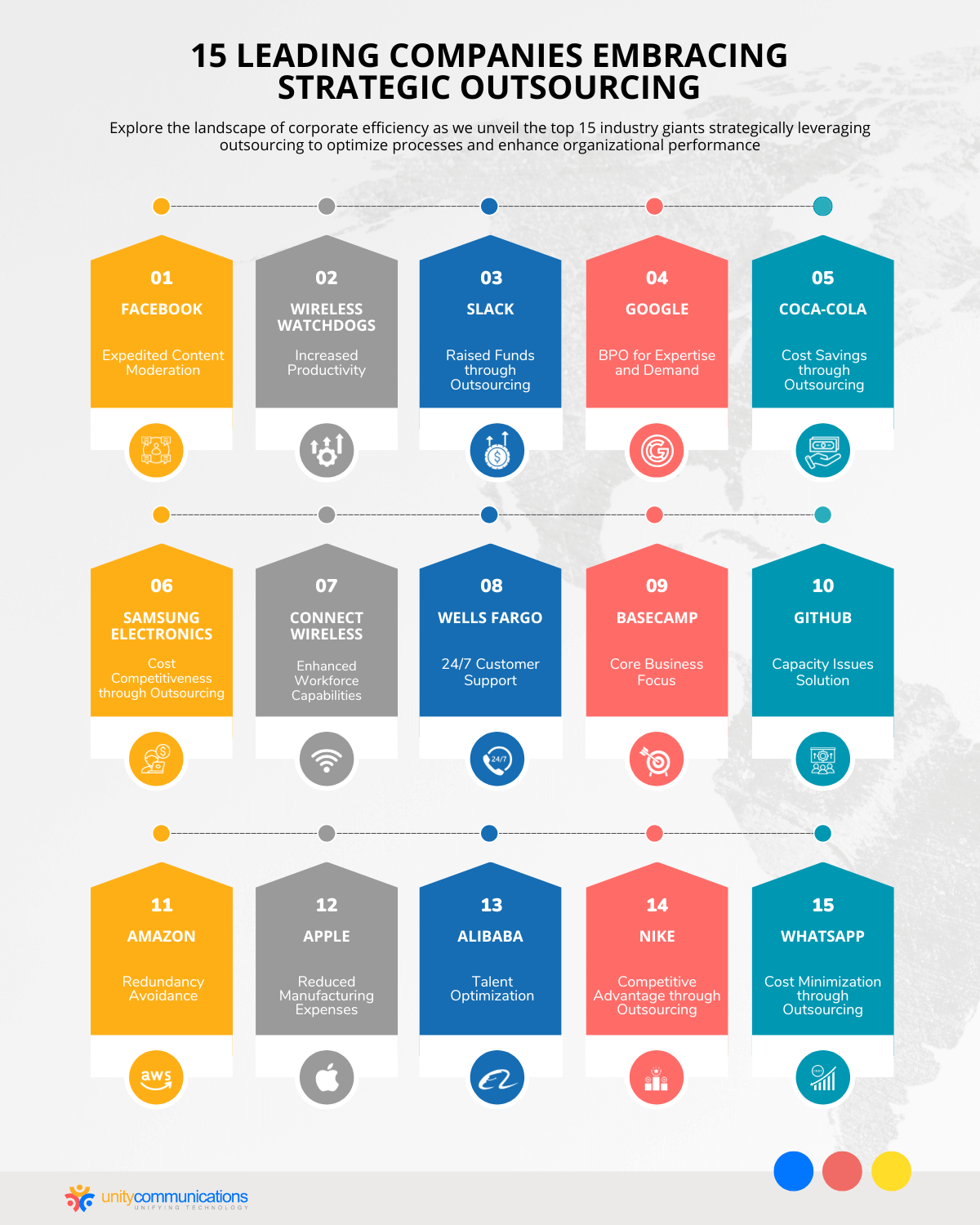Table of Contents
An enterprise does not exist independently; it needs a trustworthy partner to survive in a competitive global market. No matter your techniques, your business will remain stagnant if non-primary functions hinder your progress.
Enter business process outsourcing (BPO). The approach allows companies to cost-effectively streamline their operations while focusing on their core business offerings.
Many small, mid-sized, and large organizations have benefited from outsourcing services. To give you insights into how BPO helps grow your enterprise, we enumerate the examples of companies that outsource their front- and back-office tasks.
Why Do Companies Outsource?
Businesses outsource to cut operating costs and increase daily productivity in their front and back offices. They also aim to scale the workforce that handles tedious, non-core processes. This way, their in-house teams can prioritize improving products and services.
In its latest research, Deloitte reported that reducing costs urges 57% of executives to hire a skilled third-party team. Outsourcing enables organizations to augment staff for transactional activities such as customer service and information technology (IT) support.
Advanced BPO tools also speed up the completion of repetitive tasks. This capability lets companies optimize their resources and focus on efforts that lead to long-term success. Such business practices allow them to gain a competitive advantage in a dynamic market.
15 Examples of Companies That Outsource

After exploring the reasons behind outsourcing, let us examine the examples of companies that outsource their functions. Such insights highlight how businesses across various industries have successfully embraced what BPO is and maximized its tangible benefits.
1. Facebook: Outsource to Expedite Content Moderation
Facebook hires third-party workers to speed up and improve its content moderation processes. The social media company finds outsourcing to the Philippines and India cheaper than recruiting new in-house staff members. Besides, it benefits from tax and regulatory incentives.
2. Wireless Watchdogs: Outsource to Increase Productivity
Wireless Watchdog sought third-party support to increase staff productivity. As its referral business grew, the wireless management company’s sales team experienced a slowdown in closing deals.
By outsourcing call center operations to Unity Communications, Wireless Watchdogs’s customer-facing units and sales representatives exceeded their growth targets within four months. The quality of work also improved as the in-house team was able to focus on solving complicated issues. Wireless Watchdogs saved up to 65% in labor costs.
3. Slack: Outsource to Raise Funds
Slack is one of the prime examples of companies that outsource to raise funds. Since the beginning, the office collaboration software company has outsourced its design and app development functions.
By tapping into nearshore outsourcing, Slack managed to get 15,000 users two weeks after its launch in 2014. The company also raised a $250 million round of investment in July 2017 for a total valuation of $5 billion.
4. Google: Outsource to Meet Needed Expertise and Demand
Google adopts BPO for two main reasons: to acquire the expertise it lacks in-house and to meet the work demand when some of its full-time employees are on short-term leave.
The tech giant partners with businesses worldwide to deliver specialized services that its in-house resources cannot provide. The functions below often require dedicated training:
- Cafe operations
- Medical care
- Transportation
- Customer support
- Physical security
Moreover, Google hires temporary staff from providers when its in-house team has to cover short-term leaves and encounters spikes in work volume. Contractual workers also help the company incubate special projects. As a result, about 3% of Google’s overall extended workforce comprises temporary staff.
5. The Coca-Cola Company: Outsourcing to Cut Costs
The Coca-Cola Company is an example of a company that outsources to cut manufacturing, bottling, and storage costs. BPO has allowed the beverage enterprise to build local distribution networks, sparking competition between bottling companies and distributors. This competition reduces bottling costs and improves operating margins.
The Coca-Cola Company could prioritize its syrup production by freeing itself from manufacturing bottles and distributing products. Selling syrups to bottlers has become its primary source of revenue over the years.
6. Samsung Electronics: Outsource to Maintain Cost Competitiveness
Samsung Electronics procures device development outsourcing to maintain cost competitiveness. The South Korean conglomerate began its large-scale outsourcing initiative in 2019 to efficiently release a full lineup of smartphones while keeping prices low.
Samsung decided to outsource because it found that developing all its smartphone models in-house would be unproductive. The company also aims to ensure its smartphone pricing matches global markets. Nikkei Asia said Samsung has contracted out the development of its Galaxy M series of smartphones for India and other developing countries.
7. Connect Wireless: Outsource to Enhance Workforce Capabilities
Connect Wireless is a perfect example of a company that outsources to improve workforce capabilities. The online smartphone retailer entrusts its customer care operations to Unity Communications, cutting the time for training and onboarding.
Letting the service provider design a customer care workflow allows Connect Wireless to achieve a 95% increase in employee attendance and adherence and a 92% boost in call quality. The outsourced back-office admin team in the Philippines also brings 80% labor cost savings to the company.
8. Wells Fargo: Outsource to Provide 24/7 Support
Wells Fargo hires overseas workers to satisfy customers’ need for 24/7 support. The bank contracts customer service representatives from offshore countries such as the Philippines and India to deliver faster responses and resolutions to consumers’ concerns.
9. Basecamp: Outsource to Prioritize Core Business
Basecamp, which provides an effective task-monitoring tool for project managers, seeks support from third-party remote developers to focus on its core business. The company’s in-house staff gains sufficient time to improve internal processes by outsourcing its web development.
10. GitHub: Outsource to Solve Capacity Issues
Solving capacity issues encouraged GitHub to hire a third-party developer. GitHub could not afford to hire a full-time Git expert. Hence, it employed a contractual professional to build the Gist backend, a key sharing feature within the code-hosting platform.
11. Amazon: Outsource to Address Redundancy
Amazon is an example of a company that outsources to avoid the hassle of redundant inventory. Because the multinational e-commerce company does not store infrequently ordered products in its regular warehouses, it entrusts inventory management to third-party providers. This business practice enables Amazon to reduce working capital and speed up product delivery.
12. Apple: Outsource to Reduce Manufacturing Expenses
Apple has worked with Chinese manufacturers and Indian IT companies to lower manufacturing expenses. In 2020 alone, 98% of Apple’s direct spending on production went to 200 suppliers, 85% of which have factories in Asia.
Aside from reduced costs, outsourcing helps the tech giant diversify its supply chain. Its BPO strategy enabled Apple to keep its rigorous design process in the United States. Meanwhile, it entrusts development processes to an overseas provider.
13. Alibaba: Outsource to Optimize Talent
Alibaba is one of many examples of Asian companies that outsource to the U.S. to optimize talent. Also called China’s eBay, Alibaba contracted an American firm for website design and development work.
When Alibaba first adopted outsourcing, China encountered a scarcity of developers. Hence, founder Jack Ma sought U.S. expertise in building an e-commerce infrastructure that could function effectively amid China’s internet restrictions. Ma collaborated with the provider to develop sustainable infrastructure, allowing his team to secure capital for continued growth.
14. Nike: Outsource to Gain a Competitive Advantage
Nike uses outsourcing to gain a competitive advantage. Because it has no manufacturing plants, the footwear company outsources production to service vendors in the Philippines, Vietnam, Indonesia, China, and Taiwan.
About 500,000 workers worldwide contribute to Nike footwear manufacturing and quality control. This capacity allows the company to reap significant cost savings and generate $3.7 billion in sales revenues.
15. WhatsApp: Outsource to Minimize Spending
WhatsApp is an example of a company that outsources to minimize spending; it understood BPO’s importance as early as 2012. The communication platform noted the need to keep costs low to grow. Thus, the company procured development resources from Russia at a more affordable price than in the U.S.
Choosing the Right BPO Partner

Regardless of your business size, selecting the right BPO provider is crucial to ensuring success. You must consider critical factors when screening your potential BPO partner. Doing so lets you experience outsourcing advantages similar to those of the companies above. Note that a reliable service vendor must have the following:
- Good market reputation and credibility
- Relevant industry certifications and accolades
- A skilled and well-trained workforce
- Advanced technology and infrastructure
- Flexible and affordable pricing
- Robust security solutions and strategies
- Exemplary project turnaround time
- High trust ratings and referrals
- Scalable work strategies
- Regular quality assurance activities
- Frequent BPO training and upskilling programs
- Thorough incident response and disaster recovery plans
- Centralized communication and collaboration channels
The Bottom Line
Small, medium-sized, and large businesses work with a third party to save money, boost efficiency, and prioritize growth. The enumerated examples of outsourcing companies prove BPO’s significant contribution to expanding an enterprise.
But before reaping such benefits, you must look for the best provider that matches your business development techniques and resource allocations. You must also know the key qualifications when seeking a vendor. These factors help guarantee a healthy BPO relationship and increased profitability in the long run.
Are you planning to outsource any of your non-core functions? Contact us, and let’s connect. At Unity Communications, we help you attain your long-term business goals by providing scalable solutions and flexible employees to meet your daily needs.




